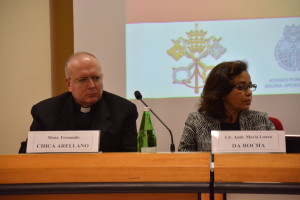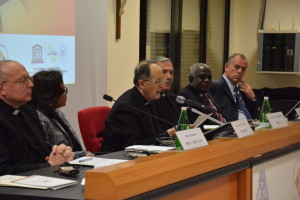by Josefa Cameron
On November 26th, the Pontifical University Regina Apostolorum and the European University of Rome in collaboration with the UNESCO Chair of Bioethics and Human Rights held the conference “Agricultural development and the fight against hunger. The call of Pope Francis’ encyclical Laudato si’.” The conference hosted a plethora of professors and representatives that spoke on issues concerning agricultural development and the fight to end hunger in reference to Pope Francis’ Encyclical letter, Laudato Si’.
Watch Alberto Garcia’s interview about the event with Telepace below at 16:40-20:00:
“What happens in a small village in Africa can have a ripple effect that reaches Europe and beyond,” said he President of the International Fund for Agricultural Development (IFAD), Kanayo F. Nwanze. He explained that today’s “problems and solutions are not limited by geographic or political boundaries.” Further information regarding his intervention can be read at the IFAD’s website here.
Professor Michael Ryan who spoke on development and decline, expressed the highlights he has taken away from the day’s events, “One thing that stands out to me is the need for all of us to continue working, reading, and investigating more deeply into the richness of Laudato Si’”. Through observing the panel of speaker and their interpretations, Ryan explained that the conference acted as an invitation for him to continue his own study, “the encyclical has a richness that you do not notice the first time you go over it, it is like walking on top of a gold mine, you probably do not realize what is under your feet”.
Professor Joseph Tham, Dean of the Faculty of Bioethics, discussed the topic of technoscience, technoethics, and technocracy. Through his interpretation of Laudato Si’, Tham suggested that the main message of the encyclical involves, “the question of technology and the problems that arise due to it. We live in a very technological society, we can forget that we are part of something bigger, that we are creatures and that technologies are a means to help us live more comfortable lives. However, technology can also damage us, damage society, and damage the environment.”
Regarding what subjects hoisted interest for further investigation, Tham found interest in the subject of ecological conversion, “somehow we need to change our mentality and to recognize that we cannot continue exploiting and manipulating nature as if it were disposable”. Tham pointed out that, “The call for this conversion is to appreciate that we are related in some way, it is an interelationality between God, nature, and man.”
Tham also took particular notice on the discourse of power that was considered during the panel, “we all want some element of power and to be able to control our surroundings. In a way, this is a cause of the problem because the desire for power leads to conflict.” Through this desire to control our environment, solutions regarding its wellbeing are overlooked and we ultimately damage it and ourselves. Pope Francis’ Laudato Si’ can be deemed as a response to this environmental dilemma caused by human recklessness. Tham noted that, “We need to analyze what is true power. I, personally, think true power is to be humble and to respect our environment.”



